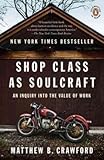
Crawford talks about the psychic appeal of manual labor, and points out that it is in dealing with the physical world that we interact with reality, and that those who do manual labor usually have to improvise based on the situation at hand - a decision-making process that improves with experience, requires thoughtfulness, and presents an objective measure of success - things often lacking in contemporary work.
 He talks about the crafts and the teaching of a craft to young people, providing an arena for failure, learning, and the development of pragmatism. He talks about the degradation of blue-collar work, then of the degradation of white-collar work, and explains that by removing judgement and discretion from the worker (wearing any color collar), Corporations are moving the thinking part of the job into the corporate process, and dumbing down, demeaning, and removing opportunities for excellence and mastery from the employee's realm. The book is a cultural rebuke to the field of knowledge management. Crawford suggests that the blue-collar, hands-on jobs considered "low" by today's culture may actually provide for more intellectual work that office jobs do.
He talks about the crafts and the teaching of a craft to young people, providing an arena for failure, learning, and the development of pragmatism. He talks about the degradation of blue-collar work, then of the degradation of white-collar work, and explains that by removing judgement and discretion from the worker (wearing any color collar), Corporations are moving the thinking part of the job into the corporate process, and dumbing down, demeaning, and removing opportunities for excellence and mastery from the employee's realm. The book is a cultural rebuke to the field of knowledge management. Crawford suggests that the blue-collar, hands-on jobs considered "low" by today's culture may actually provide for more intellectual work that office jobs do. Crawford encourages young people to go to college for an education, and to learn a craft for a livelihood. He points out that plumbers, electricians, and mechanics haven't faced outsourcing and overseas competition because the physical nature of their work and the fact that the worker must adapt to the specific situation at hand makes these fields incompatible with "knowledge management" and "process improvement" - he makes the point that when you want a deck on your house, you hire a local, not somebody in China.
Crawford encourages young people to go to college for an education, and to learn a craft for a livelihood. He points out that plumbers, electricians, and mechanics haven't faced outsourcing and overseas competition because the physical nature of their work and the fact that the worker must adapt to the specific situation at hand makes these fields incompatible with "knowledge management" and "process improvement" - he makes the point that when you want a deck on your house, you hire a local, not somebody in China.He recognizes the complexity of modern life and sets a simple virtuous standard for interacting with the modern world - he calls for achieving "a mastery over your own stuff", being able to fix and maintain your own property and devices.
 In my own experience, I take a small pleasure in repairing flat tires on my bicycle and then patching and re-using the tubes, not because it saves a bit of money and reduces waste, but because it permits me to interact with the thing-in-itself, it lets me work on my own "stuff", and it is clearly done either well or poorly.
In my own experience, I take a small pleasure in repairing flat tires on my bicycle and then patching and re-using the tubes, not because it saves a bit of money and reduces waste, but because it permits me to interact with the thing-in-itself, it lets me work on my own "stuff", and it is clearly done either well or poorly.I really enjoyed the way Crawford describes the increasingly lost concept of the journeyman, and teases out the tension between judgment and decision making on one hand and on slavish attention to rules and procedures on the other hand. He points out that although Rules may permit untrained inexperienced people to handle basic-to-normal situations, Judgment will develop journeymen who can adapt and resolve difficult-to-complex situations. This was a particularly pleasing part of the book, because the spectrum between judgment and rules is of great interest to me (I fall with Crawford in favor of Judgement).
Philosophically, he suggests a chosen life focused on the physical rather than the virtual or administrative, a work focused on livelihood rather than self-esteem, the development of judgement rather than rule-following, and a participation in the local rather than the global economy.
I found the book very similar to Robert Pirsig's Zen and the Art of Motorcycle Maintenance: An Inquiry into Values
This was an excellent book and I recommend it.



0 comments:
Post a Comment
Comments and Feedback? Love that stuff. Please leave your thoughts in the box below--